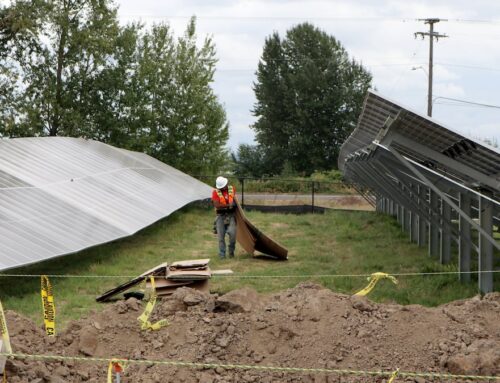North Dakota environmental agency cancels climate change work
October 6, 2025
BISMARCK — The North Dakota Department of Environmental Quality will stop studying avenues the state could take to reduce its climate-warming emissions, the agency’s director announced.
DEQ Director Dave Glatt told the state Environmental Review Advisory Council last week that the agency had discontinued its efforts under its Climate Pollution Reduction Grant from the Environmental Protection Agency in September and would wrap up any remaining work in the coming weeks.
North Dakota’s fossil fuel industries and parts of its agriculture sector faced an uncertain future a few years ago when governments and corporations were seeking to aggressively cut emissions.
The state secured the $3 million federal grant as part of an effort to examine ways it could reduce its emissions without significantly changing its economy. The program was created with money from the
Inflation Reduction Act of 2022,
a bill passed by Democrats along party lines that created large funding mechanisms for climate change mitigation.
About $1.3 million has been spent and the remainder of the money will stay with the EPA, Glatt said.
Both governmental and corporate efforts to address climate change have diminished since President Donald Trump took office. Trump and Republicans in Congress have pushed cuts in funding and tax credits for clean energy, while putting more weight behind fossil fuel production.
More North Dakota Stories
The administration is also seeking to undo the “endangerment finding” — a 2009 U.S. Supreme Court ruling that found carbon dioxide and other greenhouse gas emissions harm public health. This gives the EPA the authority to regulate those emissions.
Glatt said the DEQ decided to cut the program because of the “philosophy” of the Trump administration.
“They’re kind of reevaluating their stance on climate pollution, (so) we’ve decided to back off,” he said.
Glatt told The Bismarck Tribune the agency had reason to believe that federal grants that would have helped with implementation of the suggestions for emission reductions were unlikely to show up.
The DEQ had recent challenges receiving other money it is owed from the federal government.
The state is supposed to get federal grants to implement a variety of air and water regulatory programs, but much of the money has not yet been received, according to Glatt.
The Climate Pollution Reduction Grant group released its
plan in July,
finding that the state could reduce its equivalent CO2 emissions 80% by 2050 compared to a baseline of 84.9 metric tons of CO2 emissions in 2019.
Officials at the time said the plan served as a roadmap for industries in the state but not a mandate.
Over half of the emissions cuts were dependent on carbon capture technology, which is popular among state officials but has run into technical, financial and political
challenges.
Other efforts the state could take to reduce emissions such as expanding clean energy production, tapping into federal incentives to reduce emissions from agriculture and capturing potent methane leaks from the oil and gas industry also face questions as federal policy has shifted.
Glatt praised some of the work done by the plan’s creators. He said the agriculture and energy industries are already reducing emissions through their operations.
“There’s a lot of climate, carbon sequestration activities being done in the state that people don’t give us credit for,” he said.
While there are no other explicitly climate-related programs from the DEQ, some of the work that the agency does to improve air and water quality also has climate benefits, Glatt said.
Scott Skokos, executive director of the environmental group Dakota Resource Council, was critical of the plan’s reliance on carbon capture, though he said there were some other bright spots in the report.
He said it is disappointing to see the DEQ step back from the effort.
“I was a critic of the plan that they came up with, but I still wanted them to reduce carbon emissions,” Skokos said. “This shows that the DEQ is not serious about lowering carbon emissions any longer and I question whether they were ever.”
Search
RECENT PRESS RELEASES
Related Post


